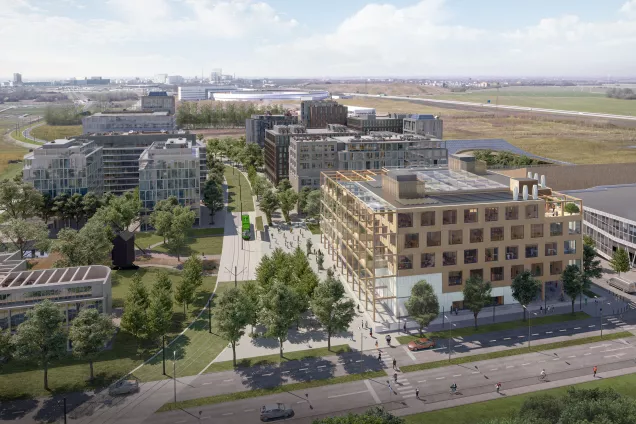Establishment in Science Village
Science Village is of great strategic importance for the entire university, and the Faculty of Science and the Faculty of Engineering (LTH) are expected to have activities in the area. Both faculties work continuously with the establishment process in order to achieve a successful outcome.
Lund University has been investigating the potential establishment in Science Village since 2016, including determining which activities to be included. In recent years, several steps have been taken towards an establishment through developing a university-wide vision for the university's presence in the Science Village and clarifying which activities will be affected by a future establishment.
Based on this work, it is confirmed that both the Faculty of Science and LTH are expected to co-locate and establish the Department of Physics, the majority of the Department of Chemistry, and parts of the Electrical and Information Technology (EIT) in the area, also referred to as Scenario 5 and Stage 2. Nanolab Science Village is also expected will be established in the area as part of Stage 1.
The next phase in the Science Village-establishment process
The next phase in the efforts to establish activities in Science Village is to evaluate the premises programme developed in December 2023 for Stage 2, and conduct an in-depth investigation of the space requirements. The objective is to create a preliminary study to concretize the spatial needs and to facilitate a smooth transition to the next phase of the project, which involves the procurement of a landlord.
The work adheres to the guidelines established in the Vice-Chancellor's decision (STYR 2022/2785) from December 2023. The assignment was given to LU Estates in close collaboration with LTH and the Faculty of Science.
Organisation around the establishment
Since January 2023, the Faculty of Science and LTH have formed a steering group for the establishment work. The faculty-based steering group is responsible for overseeing the development of activities within the relevant departments and possesses detailed knowledge of their specific needs. Led by Annika Mårtensson, Assistant Dean for sustainable campus development and widened recruitment at LTH, the steering group will continue its mission until 2025 as per the Vice-Chancellor decision.
The steering group from Lund University's central organisation will also continue its mission until 2025. It is led by Per Mickwitz, Pro Vice-Chancellor for Research, Sustainability, and Campus Development. The group will continue to have overall responsibility and supervision over the work on Stage 2. The mission also includes overall coordination of Stage 1, the establishment of Nanolab Science Village in the area, and Stage 2. The assignment will also involve monitoring the conditions for the university's establishment in Science Village based on municipal and regional planning, as well as the property owner's planning for the area.
Members from both steering committees are listed below, as per the decision made by the Faculty of Science and LTH (STYR 2023/2842) and the Vice-Chancellor's decision.
Operational project work and timeline for the establishment
The project team is working on further developing and evaluating the premises programme for Stage 2. The group consists of representatives from relevant departments and members from LU Estates. In parallel, the group works to ensures that the establishment contributes to the strategic development of education, research, collaboration, and support activities, for both activities located in Science Village and those along Sölvegatan. This comprehensive work is planned to continue over several years. Members of the project team are listed below.
Through the Vice-Chancellor's decision, the university has established a preliminary timeline for Stage 2. The premises programme processing is expected to continue until the fall of 2024, and the feasibility study is estimated to be completed in the spring of 2025. The overall goal is to compile the procurement documentation for a landlord by the summer of the same year.
LU in Science Village blog
Updates and decisions covering Lund University's Science Village efforts are regularly published on the LU in Science Village blog. It is possible to subscribe to blog posts.
Visit the LU in Science Village Blog.
Members Faculty-based Steering Group
Annika Mårtensson, Chair, Assistant Dean, LTH
Per Persson, Dean, Faculty of Science
Ola Wendt, Prefect, Department of Chemistry
Else Lytken, Prefect, Department of Physics
Two student representatives from Teknologkåren, LTH, and Lunds Naturvetarkår (LUNA) / The Science Doctoral Student Council (NDR)
Members Steering Group LU Central
Per Mickwitz, Pro Vice-Chancellor for research, sustainability, and campus development
Annika Olsson, Dean, LTH
Per Persson, Dean, Faculty of Science
Malin Gülich, LU Estates
Student representative
Members of the project team for the Science Village Establishment, Phase 2
Knut Deppert, Project Manager
Charlotte von Brömssen, Local Planner, LU Estates
Joanna Oberda, Construction Project Manager, LTH
Cecilia Schubert, Communications Officer, Faculty of Science
Per Eng-Johnsson, Project Support, Department of Physics
Herwig Schüler, Project Support, Department of Chemistry
Contact
Knut Deppert
Project manager
Contact information for Knut Deppert (staff.lu.se)
Charlotte von Brömssen
Project manager at LU Estates
Contact information for Charlotte von Brömssen (staff.lu.se)
Cecilia Schubert
Communication Officer
Contact information for Cecilia Schubert (staff.lu.se)
Function e-mail
lusciencevillage [at] science [dot] lu [dot] se (lusciencevillage[at]science[dot]lu[dot]se)
Latest news
FAQ:s about the establishment
Read frequently asked questions and answers about the Lund University Science Village establishment on the blog.
www.lusciencevillage.blogg.lu.se

What is Science Village?
Science Village is an area in the Brunnshög district in north-eastern Lund that includes MAX IV, the European Spallation Source (ESS) and the central Science Village. In addition to the planned university activities, the central Science Village will house, among other things:
- Space – offices and laboratories
- Lund Science Center for activities and exhibitions
- The Loop – a meeting place for business, academia and research
- Offices, restaurants and cafes and much more
Science Village becomes part of a dynamic and international environment, where new scientific ideas and collaborations can emerge between universities, businesses and other parts of society.
Related Sites:

